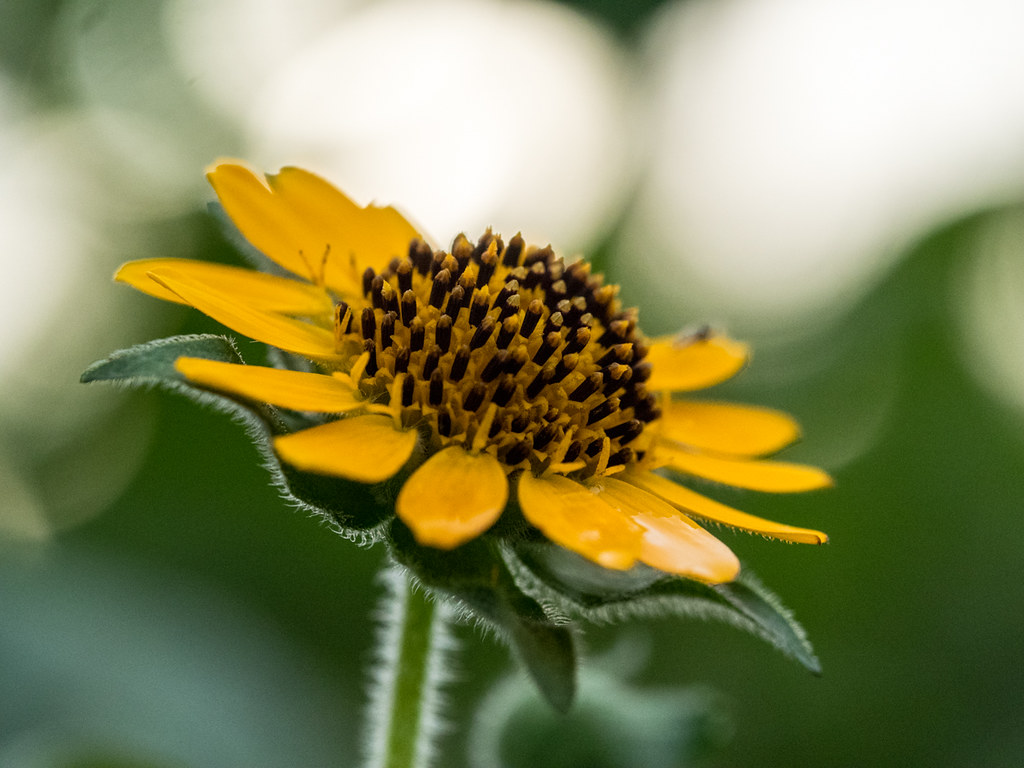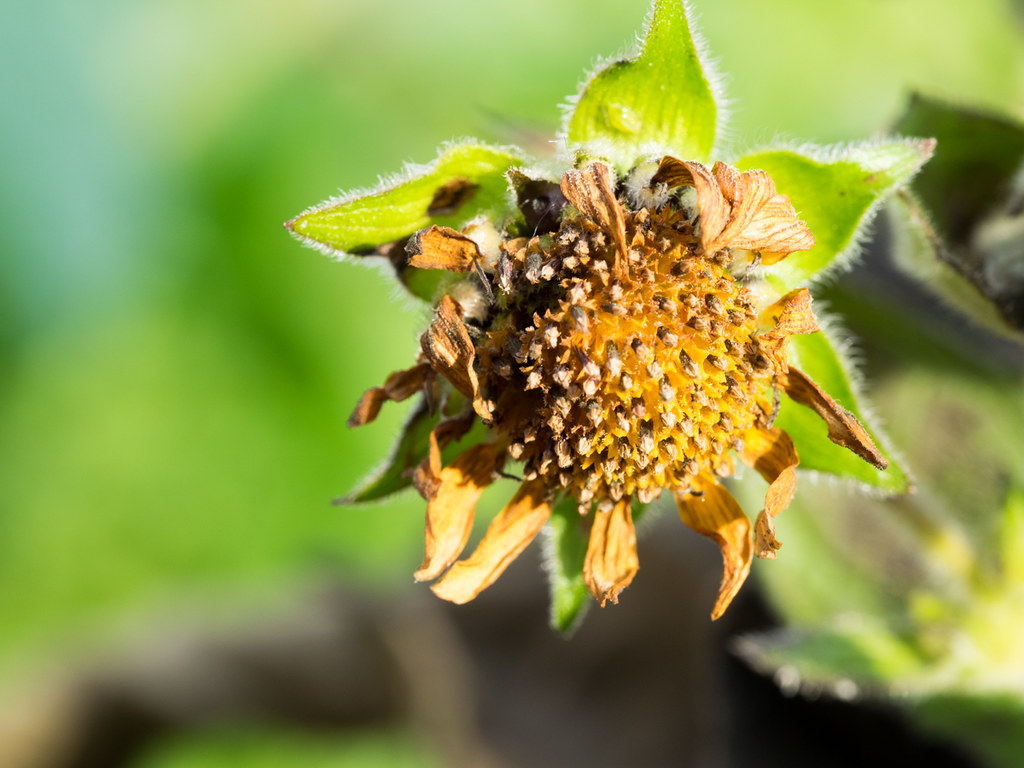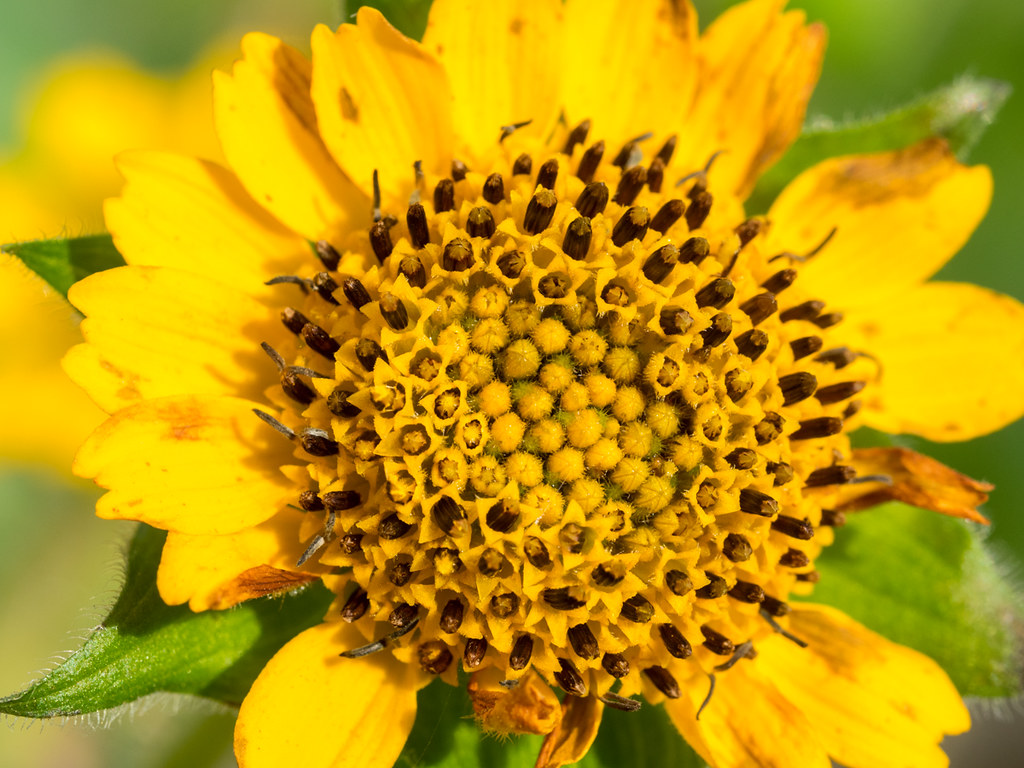Post by orflo on Dec 27, 2014 15:26:56 GMT -5
Of all the Andean tubers, yacon is probably the one that's the most difficult to obtain seeds from, there's no pollen or, if there is, very very few, and therefore seed set is difficult. Some years ago, I managed to cross in a wild polymnia with a true yacon, smallanthus (or polymnia) sonchifolia. A hybrid came out of it, with much smaller roots, and they weren't sweet. The plant however grows bigger and more voluptuous than the true yacon, and the resistance to frost is a little bit better, but don't expect miracles...
We're a few years further on, and the collection of different yacon species is up to 11 (although I suspect that two varieties are just only one, they are so close):
 yacon (7 van 7) by orflo, on Flickr
yacon (7 van 7) by orflo, on Flickr
This year we were quite lucky and had a very mild autumn, and all the yacon varieties flowered, and the hybrid as well. Some were however very late for flowering, so seed set on these is quite impossible. The flowers are, certainly compared to the large plants, very small, about 2-2,5 cms, that should be one inch or somewhat less. They have a light lemony smell (and the hybrid variety has strangely enough a very strong lemony smell)
 yacon (1 van 7) by orflo, on Flickr
yacon (1 van 7) by orflo, on Flickr
 yacon (5 van 7) by orflo, on Flickr
yacon (5 van 7) by orflo, on Flickr
 yacon (2 van 7) by orflo, on Flickr
yacon (2 van 7) by orflo, on Flickr
I checked again for pollen, but nothing could be found. After a few weeks of flowering some small seed buds were starting to form, and, based on my previous experiences, I didn't have much hope for seeds, most of these are empty. A seed that starts to form can be sen on the top sid of the flower in the next picture:
 yacon (4 van 7) by orflo, on Flickr
yacon (4 van 7) by orflo, on Flickr
So, more and more seeds seemed to be developing, and most of them on two varieties, the morado and a variety from New Zealand, but also blanco and rojo were promising, the seeds are quite small, some 3 mm thick, and n seem to need some 5-6 weeks in our climate to ripen off completely (if they aren't empty of course):
 yacon (6 van 7) by orflo, on Flickr
yacon (6 van 7) by orflo, on Flickr
To my surprise, some seeds weren't empty, but came out thick, and seem to be ok. These seeds were formed on morado, that New Zealand variety and a variety that came from Richard (here on the forum), also from New Zealand, but clearly another variety that the other NZ variety. On these plants, 13 good-looking seeds came out of the first NZ variety, 7 came out of the variety from Richard, and eleven were formed on the morado plants. I estimate that only 3-5% of the seeds that started to form came out as thicker, good-looking seeds. The rest remained empty, and they shrivelled up.
So, what could have happened: the first theory is that they could have crossed with polymnia connata, that was standing next to them and bees pollinated them.
The second theory is that the hybrid plant does have some pollen and pollinated these true varieties. And the third, most optimistic theory is that the yacons pollinated themself, and that, just as is the case with ocas, there needs to be a good mixture of varieties.
The next step will be next spring, hopefully some of these will germinate and we can see at the end of the year what the result will be. The only true yacon that was grown out from seeds (at least in recent times) is a Japanese variety, they have sown hundreds of seeds and only one germinated. Wait and see...
We're a few years further on, and the collection of different yacon species is up to 11 (although I suspect that two varieties are just only one, they are so close):
 yacon (7 van 7) by orflo, on Flickr
yacon (7 van 7) by orflo, on FlickrThis year we were quite lucky and had a very mild autumn, and all the yacon varieties flowered, and the hybrid as well. Some were however very late for flowering, so seed set on these is quite impossible. The flowers are, certainly compared to the large plants, very small, about 2-2,5 cms, that should be one inch or somewhat less. They have a light lemony smell (and the hybrid variety has strangely enough a very strong lemony smell)
 yacon (1 van 7) by orflo, on Flickr
yacon (1 van 7) by orflo, on Flickr yacon (5 van 7) by orflo, on Flickr
yacon (5 van 7) by orflo, on Flickr yacon (2 van 7) by orflo, on Flickr
yacon (2 van 7) by orflo, on FlickrI checked again for pollen, but nothing could be found. After a few weeks of flowering some small seed buds were starting to form, and, based on my previous experiences, I didn't have much hope for seeds, most of these are empty. A seed that starts to form can be sen on the top sid of the flower in the next picture:
 yacon (4 van 7) by orflo, on Flickr
yacon (4 van 7) by orflo, on FlickrSo, more and more seeds seemed to be developing, and most of them on two varieties, the morado and a variety from New Zealand, but also blanco and rojo were promising, the seeds are quite small, some 3 mm thick, and n seem to need some 5-6 weeks in our climate to ripen off completely (if they aren't empty of course):
 yacon (6 van 7) by orflo, on Flickr
yacon (6 van 7) by orflo, on FlickrTo my surprise, some seeds weren't empty, but came out thick, and seem to be ok. These seeds were formed on morado, that New Zealand variety and a variety that came from Richard (here on the forum), also from New Zealand, but clearly another variety that the other NZ variety. On these plants, 13 good-looking seeds came out of the first NZ variety, 7 came out of the variety from Richard, and eleven were formed on the morado plants. I estimate that only 3-5% of the seeds that started to form came out as thicker, good-looking seeds. The rest remained empty, and they shrivelled up.
So, what could have happened: the first theory is that they could have crossed with polymnia connata, that was standing next to them and bees pollinated them.
The second theory is that the hybrid plant does have some pollen and pollinated these true varieties. And the third, most optimistic theory is that the yacons pollinated themself, and that, just as is the case with ocas, there needs to be a good mixture of varieties.
The next step will be next spring, hopefully some of these will germinate and we can see at the end of the year what the result will be. The only true yacon that was grown out from seeds (at least in recent times) is a Japanese variety, they have sown hundreds of seeds and only one germinated. Wait and see...





